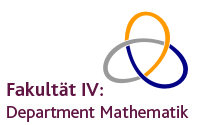Fr. 28.01.2011, Rhein-Main-Arbeitskreis Mathematics of Computation
Freitag, 28. Januar 2011, Raum: EN D 308, Zeit: 15:00 Uhr
28. Januar 2011, im Raum EN D 308
statt.
Programm
| 15.00 Uhr: |
Prof. Dr. Steffen Dereich (Universität Marburg)
Multilevel Monte-Carlo algorithms for Lévy-driven SDE's with Gaussian correction In this talk we analyze multilevel Monte-Carlo algorithms for the computation of Ef(Y), where Y=(Yt)t \in [0,1] is the solution of a Lévy-driven SDE and f is a real-valued function on the path space. We discuss several approaches and prove upper bounds for the worst case error inferred on the class of Lipschitz continuous functionals (w.r.t. supremum norm). Here, the dominant term of the upper estimate can be expressed in terms of the Blumenthal-Getoor index. Comparing the approaches, we find a significant improvement in the error estimates when applying a Gaussian correction for the small jumps in the case where the Blumenthal-Getoor index is larger than one. Our analysis is very robust in the sense that we do not impose particular assumptions on the structure of the Lévy process (e.g. subordinated Lévy processes) except the existence of second moments. |
| 15.45 Uhr: | Tee/Kaffee |
| 16.15 Uhr: |
Dipl.-Math. Doreen Fischer (Universität Siegen)
Ein tomographisches Modell der Erde als Ergebnis einer gemeinsamen Inversion von Gravitations- und seismischen Daten Wir diskutieren einen Greedy-Algorithmus zur Regularisierung tomographischer Probleme in der 3D-Kugel wie zum Beispiel das Bestimmen der Dichteverteilung in der Erde aus einer Kombination von Gravitations- und seismischen Daten sowie die Untersuchung des Massentransportes im Amazonasgebiet mit Hilfe von Gravitationsdaten aus der GRACE-Mission. Der Reiz des Algorithmus ist, dass die Approximation an die Datendichte und an die Detailstrukturen der exakten Lösung angepasst ist. Desweiteren werden unterschiedliche Datentypen und verschiedene Basisfunktionen kombiniert. Außerdem kann eine größere Anzahl von Datenpunkten in die Betrachtungen mit einbezogen werden als bisher möglich. |
| 17.00 Uhr: | Prof.
Dr. Klaus Böhmer (Universität Marburg)
A Nonlinear Discretization Theory with Applications to Meshfree Methods: Quasilinear and Fully Nonlinear PDEs We extend for the first time the linear discretization theory of Schaback, developed for meshfree methods, to nonlinear operator equations, relying heavily on methods of Böhmer, Vol I. There is no restriction to elliptic problems or to symmetric numerical methods like Galerkin techniques. Trial spaces can be arbitrary, but have to approximate the solution well, and testing can be weak or strong. We present Galerkin techniques as an example. On the downside, stability is not easy to prove for special applications, and numerical methods have to be formulated as optimization problems. Results of this discretization theory cover error bounds and convergence rates. These results remain valid for the general case of quasilinear and fully nonlinear elliptic differential equations of second order. |
| anschließend: | Nachsitzung |
Den Anfahrtsplan finden sie hier.
Der Workshop ist eine gemeinsame Veranstaltung mit dem DFG-Schwerpunktprogramm 1324 EqIS (Mathematische Methoden zur Extraktion quantifizierbarer Information aus komplexen Systemen).
Wir laden alle Interessenten herzlich zu den Vorträgen ein.

